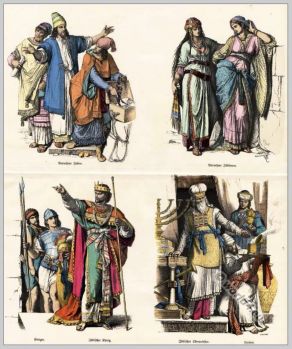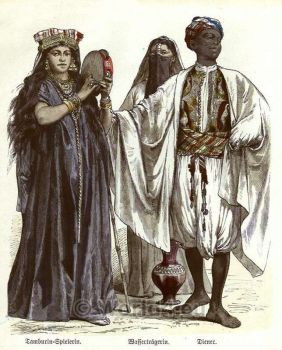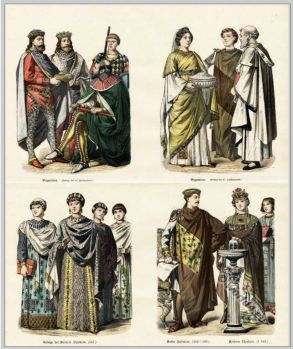Bem-vindo aos nossos novos jogadores brasileiros. Por favor leia
Talk:Kingdom of Andus
From Sanctuary Shard
Expanded lore on Andus for native charactres and estate holders; overview, failings, hospitality, slavery, gossip, clothing, and proverbs.
- Usage warning
- This page represents expanded lore for the players of Andus. It is geared towards those who are interested in playing natives or estate owners. One of the real values of Sanctuary is that it is home to travelers who bring all manner of unique perseptive to our role-play. No aspect of this page or any other on this wiki should be used to brow-beat, shame or belittle another player. If for some reason, you meet someone playing a native who is off page, please instead bring the issue to one of the admins or the kingdom leader that we might handle it respectfully.
Contents
Overview
"Welcoming and hospitable to Guests, and easily offended when in the company of rudeness, they are people highly focused on their hobbies and occupations, prefer small talk before getting down to business as personal relationships are important to the business. They prize modest behavior in women and reserved, almost austere demeanors in men."
The Andalusians are a people of extreme academic talents with highly developed forms of custom and courtesy which controls and contains a deeply passionate and often violent nature. They are the ultimate keepers of science, mathematics, and medicine, they excel as orators, philosophers, and governors.
Polite society calls for overt courtesy, the avoidance of giving insult, and long social events. Andalusians events are almost always arranged to provide spaces to lounge. Publicly, the Andalusians are approachable and welcoming.
Privately, they are intense and silent, as if everyone was an introvert by nature, needing to recharge themselves for the next social gathering. In the rooms behind the Dewaniah, the Andalusians people create an oasis of reflection and solitude, where they may enjoy the company of their families, their studies, and their businesses. As you may suspect, Andalusians are passionate, skilled and languorous lovers with a preference for aphrodisiacs and creative bed sport.
Most Andalusians are talented businessmen and merchants, their skill at making everyone feel welcome, allows for excellent business opportunities to flourish. It is important not to offend a Andalusians, especially a man. While they will give you ample opportunity to back peddle from your mistakes, if you do not, the offense can only be answered in blood. There would be no trade between Midrvegr and the Andus if not for the more socially skilled Alfarians.
Failings
Despite their overtly polite and hospitable nature, Andalusians are not without fault. To outside eyes they can oftentimes come across as staunch or austere, inflexible in their ways. For generations the culture has been dominated by men in many things, leading to patriarchal habits and a subtle domineering nature among their people. The Andalusians consider themselves collectively well-taught and well-bred, so may often come across as confidently arrogant among others, sometimes to the point of condesension (spelling please!)
Hygiene both physically and spiritually is a matter of great pride and importance to the Andalusian people, so matters of physical cleanliness especially may provide surprising affrontation (better word here maybe). (could we add something like a subtle "insult" gesture among andalusians is dabbing the nose with handkerchief or back of hand to suggest their company smells? idk this may be too modern/far left)
If one absolutely seeks the ire of an Andalusian native, there are three things that will guarantee reaction: desecrating or otherwise vandalising a site of holy ground or any figure or symbol recognized as holy among their people, overtly and belligerently insulting or abusing their hospitality most especially while on Andalusian soil, or by directly harming a person of Andus outside of self defense while they travel in the Sultan's name.
Hospitality
This details the Arabian rules on hospitality and for the sake of simplicity will cover both Egyptian and early Greco-roman traditions as well, though I have linked some articles on Xenia, Greek hospitality.
The Arabian concept of honor places enormous importance on hospitality. this may be a product of the hot desert environment; no one could afford a reputation for failing to treat visitors well. Only sworn enemies refuse each other hospitality, and even they have to respect certain rules. It might even be permissible to take the basics of survival from someone who refuses them. This doesn't mean that a stranger could walk into any city house and demand food, hut a fairly distant acquaintance might expect it - and in the wilderness, groups would shelter lone wanderers.
The usual rule is that a visitor can claim the privileges of a guest from a household for up to three days. After that, the guest should at least help with tasks such as fetching water or tending animals. Failure to do so is impolite, but it is acceptable for an individual traveling with a desert tribe to move from family to family every three days throughout the journey. Landlords who charge rent according to the number of tenants can say that anyone who stays more than three days is a tenant.
This was taken from GUURPS Arabian Nights page 17 side bar. See also: Etiquette 101: The Do's and Don'ts of Visiting an Arab Home. The greek concept of hospitality is Xenia, examples of Greek hospitality can be found in The Odyssey, and is still part of modern practice.
Slavery
Slavery in the Mediterranean world prior to the roman empire spanned the gambit of tradition and social expectations. Please understand that slavery in America during the colonial period is NOT the norm for historical slavery no matter how Hollywood likes to project it. We use a model that is most similar to slavery in 10-15th century Muslim Spain as the original Arabic culture for Sanctuary was based out of Cordoba Spain. Additions and clarifications have come about over the last two decades in RP.
I am sure that this section will bring up questions on specifics. Please be prepared to hear that minor variations may be matters of tradition that vary by sub-race or tribe or even family. Here are some generally relevant points.
- There are three types of slaves in Andus; The Rasa who are born slaves, the Al'misam who are criminal slaves, and prisoners of war who are legally considered prisoners rather than slaves.
- Prior to the ending of the Thorn King Era slavery was highly prejudicial towards non-humans. However, slavery in Andus has always been prejudicial towards those who are not members of the current Andus religion.
- Slaves who were members of the Andus faith, i.e. followers of Acrab were granted the concept of "legal and spiritual personhood". So while they can be bought, sold, and punished they could not be raped, maimed, separated from their families, or refused the basic rights of food, shelter, and worship.
- It is considered illegal to free a slave without providing them with the education or funds to support themselves as a free person.
- Punishment of a slave or a prisoner of war is acceptable. The concept that one could not strike, cage or strip a slave is unheard of in the culture. It is a free person's right to enforce proper behavior on one who is a slave. As a general rule, any punishment that a slave could recover from in three days is considered acceptable.
Al'misam
Criminal slaves are those that have committed some crime for which death is too severe but fines and punishment are not enough. The term of service is usually seven years, after which they are freed. The life of a Al'misam is harsh, and they spend most of those years in heavy chains or caged. Those that purchase criminal slaves are honor-bound to teach the criminal to mend their ways. And warn them to learn their lessons so as to avoid coming back as a desert rat in their next life. Many of the condemned and some criminal slaves are bought to fight in the gladiator pits, where they may earn their freedom after 3 years.
Rasa
The Rasa on the other hand live very different lives, while bound to their owners, they have much more freedom and a great deal more comforts than the Al'misam. The slave born must purchase their freedom or be freed through marriage. The Rasa may engage in trade, travel, or even manage property on behalf of their owners. Those that own the slave born treat their property with kindness, for to do otherwise is to invite the same fate down upon their heads.
All Rasa wear an iron collar around their neck to denote their position. Once they have purchased their freedom, they often enter the community as a member of their owner's family, and in some cases marry younger sons. Some, of course, strike out on their own. Depending on their owner's own financial state, the recently freed slave may in truth be gifted with all or most of their purchase price to begin their new lives.
Some Rasa do in fact leave their master, but this is rare. Finding someone to remove their collar is condemning both of them to death, and the un-collared Rasa live their lives in fear of being caught and returned to the cycle of life.
- Clarification
- Rasa are male and female. The examples given above are about female Rasa, but there is an equal number of male Rasa.
Prisoners of War
Prisoners of War are expected to perform physical labor until they are ransomed. They are generally treated well as long as the prisoner behaves. Failed attempts to escape normally result in the prisoner's death.
Gossip
What’s the deal with Andalusian gossiping? Do we try to mind our own business or is there a flavor of being in each other’s business?
Those are actually to seperate questions. "Do Andalusian's gossip vs do Andalusians interfer in others business."
Both answers have everything to do with one's relationship to the other person. Family absolutely gossips and interferes in everyone's business, with the old being more likely to interfer on behalf of a younger person, and a man to interfer with a woman's business.
However, once we begin to have greater and greater seperation from a person personally the line of what is considered gossip vs slander and what is considered helpful vs shaming increases dramatically.
Like most mediterranean cultures "sticking your nose" into someone else business can have massive ramifications. People can loose face and be shamed as you are saying to them "you are wrong and can't handle your our business", you can be seen as rude and uncooth because "you don't know better", or even so far as people thinking you are under the control of evil spirits sent to cause trouble.
Gossipping about someone you don't know well, or is above your station, is just as stupid in Andalusian culture as it can be in modern culture -- you never know what the reaction to your comments will be. These are tribal people, and words have power, one is very careful.
Ovadya Adds: Very Greek. Where reputation was everything and often meant the difference between having allies to protect you from slander or finding yourself suddenly friendless in dangerous waters.
Right, in cultures like this where everyone knows everyone else, one's reputation and relationships are very carefully built decks of cards, one pokes at them very very carefully.
Consider something as simple as mentioning that one person likes another? Unless you are that person's mother speaking to the other person's mother with the intention of arranging a marriage you could be stepping into a whole lot of things you don't know about.
For example, even mentioning that person A likes person B can go HORRIBLY wrong if person B is engaged to person C ... because person B may be blamed for it. Or even person C may think that now person A has caused the evil eye with envy for their betrothed.
Clothing
Traditional clothing in Andus is blend of late greek and early arabic styles:
See Also
Pending Topics
- Haggling
- New Patriarchy (Dating, Marriage, Divorce)
- Reputation
- Showing off Skin
- Complimenting someone’s stuff
- Getting down to business - how is business arranged between people? Bribes
- Disagreeing
- God doesn’t will all, Tradition does
- Religion
- Gahwa
- Social gathering deniwah or symposium
- Hetari
- Humanitarianism
- Dialect


